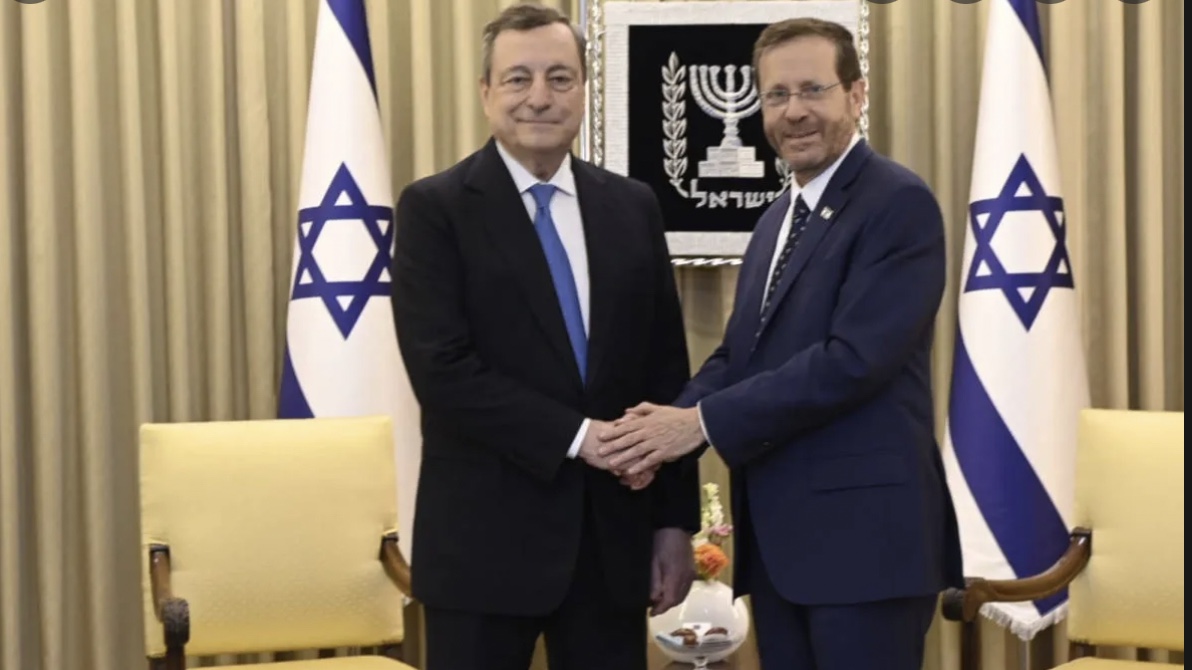The tour of the Italian premier started yesterday, Mario Draghi in Israel. After meeting with the president Isaac Duke, we will see with the premier Naphthali Bennett and then continue in the direction Ramallah. At the center of the talks the energy question, security and bilateral cooperation.
The ties between Italy and Israel have strengthened in recent decades, in crucial sectors such as research and the economy. According to the government, this is the basis for moving forward: both in terms of technologies and energy, from gas to green hydrogen.
With funds from the NRP, Italy is focusing above all on renewables, but a project of interest remains in the background, the gas pipeline Eastmed, which would carry Israeli gas, from the fields discovered off the coast, to Italy and Europe, via Greece and Cyprus.
But there is also another possible submarine gas pipeline under discussion which - unlike the first - would include Turkey in the energy route to the West, connecting it to the Israeli field. Leviathan.
Draghi arrived at the airport and is taken to the Italian Temple in Jerusalem where he talks about the "ingredients for lasting peace", that is to say "tolerance, mutual respect, love of neighbor ", reaffirming the commitment of the Italian government in the fight against anti-Semitism for "combat discrimination of all kinds against Jews".
In the afternoon the head of the Italian government went to the Knesset to meet the foreign minister Yair Lapid. A meeting that ranges from cooperation between the two countries to the geopolitical situation after the Russia-Ukraine war.
Rome, within the framework of common European action and the Atlantic alliance, is ready to use all possible shores to favor a peace process and, more urgently, avert the food crisis. And, on this front, Israel could be an important actor which, while condemning the Russian invasion, has so far shown an attitude of greater prudence towards Moscow than other countries.
"In moments of crisis, uncertainty, war, such as the one we are experiencing, it is even more important to firmly oppose the political use of hatred - says Draghi -. We must promote tolerance, mutual respect, love of neighbor: these are the real ingredients of lasting peace ".
After his first trip to the Middle East, the Prime Minister will be in Kiev on Thursday together with German Chancellor Olaf Sholz and French President Emmanuel Macron. This is a very delicate mission, which precedes the opinion of the Commission on the status of candidate for EU membership for Ukraine.
Gas from the Middle East
Europe's dependence on Russian gas amounts to 150 billion cubic meters, while Italy's is around 30 billion cubic meters. Israel became a gas exporter country after the discovery of the gas fields Tamar e Leviathan whose size is estimated respectively at around 300 billion and 620 billion cubic meters. Currently, Israeli gas does not arrive in Italy and the quickest way to create a corridor from Leviathan to Italy is to exploit the existing one. “Peace pipeline"Which connects the city of Ashkelon with the Egyptian city of Al-Arish on the Sinai coast and of which 25% was purchased by the Italian Snam in 2021.
The already existing liquefying plants would be used here to then transport the gas in the form of liquefied natural gas by ship to Italian ports. It is easy to implement but not decisive, because it would only allow between 2 and 3 billion cubic meters of gas to reach Europe.
"In Israel, there is currently an export potential of 20 billion cubic meters. The Egyptian system can now only absorb a small part. It would therefore be a bridging solution, it should be combined with other routes ", explains a source familiar with the negotiations to Repubblica.
"It is also important to remember that the reference market for LNG is the global one, there are already existing agreements, and that gas can be moved to where prices are higher.".
Only through the construction of gas pipelines that allow gas to arrive from Israeli fields directly to Europe could more significant volumes be achieved. The projects already exist: on the one hand there is EastMed, already included in the plan "Repower EU". And the pipeline designed to bring Leviathan's resources to Cyprus, later to Greece and thence through Poseidon, in Italy.
It is an off-shore, underwater gas pipeline, for which preliminary studies already exist, but it should be built. The cost is 6 billion euros, for approximately 2.000 km of infrastructure, ideally ready in 2027 and capable of transporting between 10 and 20 billion cubic meters.
The critical items underline the complexity of construction, possible repercussions on the seabed and costs higher than those of an on-shore gas pipeline. The advantages have to do with the reliability of the infrastructure: "The difference between a pipe and transport by ship after liquefaction is that with a pipe you have total control over where the gas arrives.“, Continues the source.
EastMed it would give Europe direct access to Israeli gas and total Brussels control over supplies. Italy, as a point of arrival, would benefit from this. Alternatively, Israeli gas could pass through Turkey, building a gas pipeline that would connect from Israel to the existing one. Tanap, which from Azerbaijan brings gas to Italy via the Tap in Greece. The construction times for this structure would be longer and according to Tap it would take between five and six years to complete the work.
